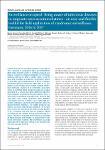Surveillance on speed: Being aware of infectious diseases in migrants mass accommodations - an easy and flexible toolkit for field application of syndromic surveillance, Germany, 2016 to 2017
Sarma, Navina
Ullrich, Alexander
Wilking, Hendrik
Ghozzi, Stéphane
Lindner, Andreas K.
Weber, Christoph
Holzer, Alexandra
Jansen, Andreas
Stark, Klaus
Vygen-Bonnet, Sabine
Europe received an increased number of migrants in 2015. Housing in inadequate mass accommodations (MA) made migrants prone to infectious disease outbreaks. In order to enhance awareness for infectious diseases (ID) and to detect clusters early, we developed and evaluated a syndromic surveillance system in three MA with medical centres in Berlin, Germany. Healthcare workers transferred daily data on 14 syndromes to the German public health institute (Robert Koch-Institute). Clusters of ID syndromes and single cases of outbreak-prone diseases produced a signal according to a simple aberration-detection algorithm that computes a statistical threshold above which a case count is considered unusually high. Between May 2016–April 2017, 9,364 syndromes were reported; 2,717 (29%) were ID, of those 2,017 (74%) were respiratory infections, 262 (10%) skin parasites, 181 (7%) gastrointestinal infections. The system produced 204 signals, no major outbreak was detected. The surveillance reinforced awareness for public health aspects of ID. It provided real-time data on migrants' health and stressed the burden of non-communicable diseases. The tool is available online and was evaluated as being feasible and flexible. It complements traditional notification systems. We recommend its usage especially when laboratory testing is not available and real-time data are needed.

